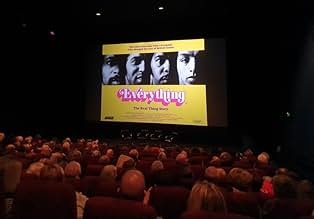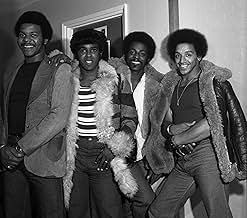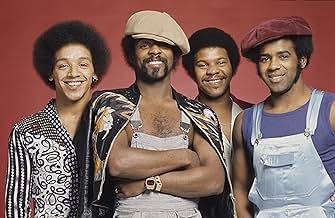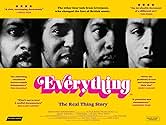Ajouter une intrigue dans votre langueDubbed 'the black Beatles' by the British tabloids, the 'other' four lads from Liverpool recount their incredible story from the tough streets of Toxteth to the bright lights of New York.Dubbed 'the black Beatles' by the British tabloids, the 'other' four lads from Liverpool recount their incredible story from the tough streets of Toxteth to the bright lights of New York.Dubbed 'the black Beatles' by the British tabloids, the 'other' four lads from Liverpool recount their incredible story from the tough streets of Toxteth to the bright lights of New York.
Eddie Amoo
- Self
- (as Eddy Amoo)
Michael Denne
- Self
- (as Mick Denne)
Avis à la une
I've been a Real Thing fan since the 1970s, and have seen then hundreds of times across the UK. Over the years they have lost two of their members, but they keep performing - as good today as they've always been. I knew quite a lot about their history beforehand, but this new film opened my eyes to the appalling racism and prejudice they suffered in their early days. It's a very powerful film, full of emotion and heartache. Ray Lake (who sang falsetto in the band) was emotionally tortured throughout his short life. But his tragedy is counterbalanced with humour, love and beautiful music. To people who think they know everything about British music already - you really don't. Finally, now, we have a film which properly addresses what it was like to be a black performer in the 60s, 70s and 80s. Superb stuff and extremely moving - right from the opening credits onwards. I saw it on the big screen in London and can't wait to see it again.
This gives the true account of Real Things rise to fame, which will appeal to all of their fans.
Furthermore, it gives a great insight into the music industry across 3 decades, from the 70's.
Thoroughly enjoyable. There's more hits than you will remember too.
Furthermore, it gives a great insight into the music industry across 3 decades, from the 70's.
Thoroughly enjoyable. There's more hits than you will remember too.
10wilvram
Even when their mammoth hit You To Me Are Everything could be heard on every pub jukebox in the summer of 1976, The Real Thing didn't receive the closest of attention from the media, with many assuming they were an American group. This has tended to remain the case, with cultural commentaries on the era tending to focus on the Punk phenomenon.
Director Simon Sheridan decided to put this right and has interviewed all those who knew the band and were familiar with their development, the pressures they faced, and the difficulties in establishing themselves in an often hostile environment. This inevitably means a reliance to a large extent on talking heads, but all concerned have something relevant and interesting to say and are an indispensable part of the story. This goes right back to the memorable time when Eddie Amoo's first band, The Chants, were backed by no less than The Beatles at the Cavern Club in the early Sixties. Time is also devoted to the album Eddie and his brother Chris were most proud of, 4 From 8, on the experience of growing up in the deprived Liverpool 8 district.
Despite moments of poignancy, not least the later troubles and tragic early death of backing vocalist Ray Lake, this is essentially a story of triumph in the face of adversity, and is recommended for all fans of the group, as well as those with an interest in black British cultural history.
Director Simon Sheridan decided to put this right and has interviewed all those who knew the band and were familiar with their development, the pressures they faced, and the difficulties in establishing themselves in an often hostile environment. This inevitably means a reliance to a large extent on talking heads, but all concerned have something relevant and interesting to say and are an indispensable part of the story. This goes right back to the memorable time when Eddie Amoo's first band, The Chants, were backed by no less than The Beatles at the Cavern Club in the early Sixties. Time is also devoted to the album Eddie and his brother Chris were most proud of, 4 From 8, on the experience of growing up in the deprived Liverpool 8 district.
Despite moments of poignancy, not least the later troubles and tragic early death of backing vocalist Ray Lake, this is essentially a story of triumph in the face of adversity, and is recommended for all fans of the group, as well as those with an interest in black British cultural history.
What can I say! I thoroughly enjoyed it!
I was transported back to the carefree, uncomplicated days of 1976 but left wishing maybe I had known more about the struggles the band had faced.
An interesting and entertaining documentary on Liverpool born-and-bred pop-soul band The Real Thing who had a good measure of U.K. success in the late 70's and also a mini-revival in the mid-80's. Their story is to!d in traditional film-biographical fashion, relating their story from back-to-front, with archival footage of the band"s beginnings and commercial breakthrough with comments from the still-extant band members (sadly, one group member Eddie Amoo died just after making his contributions here), friends, associates and admiring contemporaries.
The group's roots in fact go all the way back to the original Merseybeat boom of the early 60's when Eddie Amoo was in a highly regarded but commercially unsuccessful all-black Liverpool-born vocal group The Chants which leads to some almost inevitable Beatles-related anecdotes, which despite some pictorial evidence to the contrary, sounded a little apocryphal to me. It might have been nice for someone to have contacted Paul McCartney to contribute a cameo interview to add a little credence to some of these early 60's memories.
The group proper formed in 1972 and garnered initial success by winning popular TV talent show of the day, "Opportunity Knocks" but sadly there's no existing footage of their appearances. Lasting success finally arrived for them in 1976 with two cracking pop-soul songs presented to them by the outside songwriting team of Gold and Denne, "You To Me Are Everything" and "Can't Get By Without You" but the group was keen to record their own material and spurned a third surefire hit from the same team to record a change-of-pace ballad of their own. Although that song, "You'll Never Know What You're Missing" made the charts, it didn't do as well as its predecessors and perhaps some momentum was lost. Certainly they were never quite as popular again, although they did have their moments.
Their later highlights included one more big hit, the "Star Wars"-inspired "Can You Feel The Force", considerable success in the mid-80"s albeit with remixes of their earlier hits and in particular the recording of their ground-breaking, critically-acclaimed social-commentary album "4 From 8" even if wasn't successful at the time.
Of course, being a rock documentary, there are inevitably downsides to the story too, the biggest of which involved one of the band members struggling to beat a drink and drug addiction and eventually being sacked just before committing suicide through a drug overdose. In addition, there was their misguided decision to play Sun City in South Africa with their old benefactor David Essex. You also have to wonder how they got through what Neil Sedaka called "The Hungry Years" before they were able to benefit from playing the nostalgia circuit which they apparently still do today. One positive element I was pleased to see was that this one time a group actually revered their manager, (who did indeed name them after a Coca Cola advert) and so didn't have any hard-done-by grievances to report on that front.
There are big claims made for the group by their supporters here as regards their significance to black culture then and now and I'm not going to argue with them. The black Beatles they weren't but they all seemed like decent guys and fairly modest and humble about their achievements.
In the end I'd probably agree that they were a well named group.
The group's roots in fact go all the way back to the original Merseybeat boom of the early 60's when Eddie Amoo was in a highly regarded but commercially unsuccessful all-black Liverpool-born vocal group The Chants which leads to some almost inevitable Beatles-related anecdotes, which despite some pictorial evidence to the contrary, sounded a little apocryphal to me. It might have been nice for someone to have contacted Paul McCartney to contribute a cameo interview to add a little credence to some of these early 60's memories.
The group proper formed in 1972 and garnered initial success by winning popular TV talent show of the day, "Opportunity Knocks" but sadly there's no existing footage of their appearances. Lasting success finally arrived for them in 1976 with two cracking pop-soul songs presented to them by the outside songwriting team of Gold and Denne, "You To Me Are Everything" and "Can't Get By Without You" but the group was keen to record their own material and spurned a third surefire hit from the same team to record a change-of-pace ballad of their own. Although that song, "You'll Never Know What You're Missing" made the charts, it didn't do as well as its predecessors and perhaps some momentum was lost. Certainly they were never quite as popular again, although they did have their moments.
Their later highlights included one more big hit, the "Star Wars"-inspired "Can You Feel The Force", considerable success in the mid-80"s albeit with remixes of their earlier hits and in particular the recording of their ground-breaking, critically-acclaimed social-commentary album "4 From 8" even if wasn't successful at the time.
Of course, being a rock documentary, there are inevitably downsides to the story too, the biggest of which involved one of the band members struggling to beat a drink and drug addiction and eventually being sacked just before committing suicide through a drug overdose. In addition, there was their misguided decision to play Sun City in South Africa with their old benefactor David Essex. You also have to wonder how they got through what Neil Sedaka called "The Hungry Years" before they were able to benefit from playing the nostalgia circuit which they apparently still do today. One positive element I was pleased to see was that this one time a group actually revered their manager, (who did indeed name them after a Coca Cola advert) and so didn't have any hard-done-by grievances to report on that front.
There are big claims made for the group by their supporters here as regards their significance to black culture then and now and I'm not going to argue with them. The black Beatles they weren't but they all seemed like decent guys and fairly modest and humble about their achievements.
In the end I'd probably agree that they were a well named group.
Le saviez-vous
- AnecdotesEddie Amoo died during production of the documentary, aged 73.
- ConnexionsFeatured in Millington/Sheridan (2020)
Meilleurs choix
Connectez-vous pour évaluer et suivre la liste de favoris afin de recevoir des recommandations personnalisées
Détails
- Date de sortie
- Pays d’origine
- Site officiel
- Langue
- Aussi connu sous le nom de
- Children of the Ghetto
- Lieux de tournage
- Liverpool, Merseyside, Angleterre, Royaume-Uni(Stanhope Street, Toxteth)
- Société de production
- Voir plus de crédits d'entreprise sur IMDbPro
Box-office
- Budget
- 250 000 £GB (estimé)
- Montant brut mondial
- 17 097 $US
- Durée
- 1h 34min(94 min)
- Couleur
- Rapport de forme
- 1.78 : 1
Contribuer à cette page
Suggérer une modification ou ajouter du contenu manquant
























